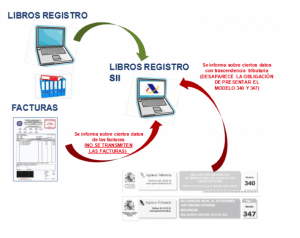The Immediate Supply of Information in Spain

All roads lead to Rome
Just after the CIAT Technology Meeting held in Miami (USA) last October, I published in this blog a post that presented the progress of electronic invoicing in Latin America. This meeting showed how different actors, different countries, administrations and companies were simultaneously thinking and developing useful and effective solutions for the tax management, under the common denominator of an intensive use of Information and Communication Technologies.
As a result of the electronic invoicing model – with its different variations – adopted or in the implementation phase – in many Latin American countries, Spain has decided to implement the system called “Immediate Information Supply” (“Suministro Inmediato de Información” –SII in Spanish), which articulate a formal obligation to large companies (with an invoicing of more than 6 million euros), VAT groups and companies registered in the monthly return system (régimen de devolución mensual or REDEME).
These taxpayers will have to submit to the Tax Agency, within a maximum of four days, the details of their invoicing submitted electronically (via web services based on XML messages exchanges or, where appropriate, through the use of a web form), with which the information of different records will be configured: received invoices and vouchers registry book, investment goods registry book, intra-community transactions registry book and cash flow registry book (annual).
This SII is not about submitting the taxpayers’ specific invoices, but registering the corresponding information practically in real time on the website of the Tax Agency.
The first positive impact of this system will be that it will eliminate the compulsory submission of information statements corresponding to models 340 (registration books), 347 (operations with third parties) and 390 (VAT annual summary) which, until now, enabled and supported the VAT management.
Starting from the SII, in the future the Spanish Tax Agency will already have this information, which will allow to make the VAT pre-returns.

This new system constitutes a true transformation of the Value Added Tax management in Spain, since the 62,000 affected respondents perform almost 80% of the commercial transactions that are carried out annually in the Spanish economy.
It is expected that in 2019-2020 this will become mandatory for the three million companies registered in Spain.
As rightly stated in the Explanatory Memorandum to the regulation of this obligation, “it seems reasonable to think that the substantial progress in record keeping made in the use of new technologies will allow transforming the bookkeeping in a more modern system that brings the moment of the recording or accounting the invoices closer to the actual conclusion of the economic operation that
underlies them “.
With this system, the Spanish Tax Agency will have quality information in a sufficiently short time interval to speed up the VAT management system. It will be possible to obtain “Tax Data”, since the taxpayer will have at the Electronic Headquarters of the AEAT a “Declared” and a “Contrasted” registry, the latter with the contrasted information from third parties belonging to the common system or from the AEAT database, so that taxpayers can check this information before the end of the deadline for submitting their monthly VAT return.
Likewise, the taxpayer will have the possibility to correct the mistakes made in the dispatches without having to be required by the AEAT for this correction, which simplifies the reduction of the number of information requirements by the AEAT, since many of the current requirements are intended to request the books, records, invoices or data contained therein to verify certain transactions.
Finally, this new system will make possible to reduce the refund deadlines by providing AEAT with the information in near real time and with greater detail about the operations.
The entry into force of this Immediate Supply of Information System (SII) is on July 1, 2017, although there are already more than 400 companies that are transmitting this information to the Tax Agency, among which are the large energy distribution or mobile telephony companies.
In short, Spain opts for a different solution, a distinct path from the one undertaken by electronic invoicing models, but that leads us to the same destination, to the gates of the particular “Rome” of the Tax Administrations: improving voluntary compliance of tax obligations.
2,077 total views, 4 views today

1 comment
Hello Juan Francisco,
This is a very useful article. I think it summarizes very well the current status of the SII in Spain. Two little suggestions though that you may consider to include: 1) From July to December, taxpayers will have 8 days instead of 4, for submitting the transactional information to the AEAT.
There are some regions of Spain where the SII will not enter into effect in July 1: Álava, Guipúzcoa, Vizcaya and Navarra will not join the SII this year. Probably January 2018.
Regards,
Ramon Frias